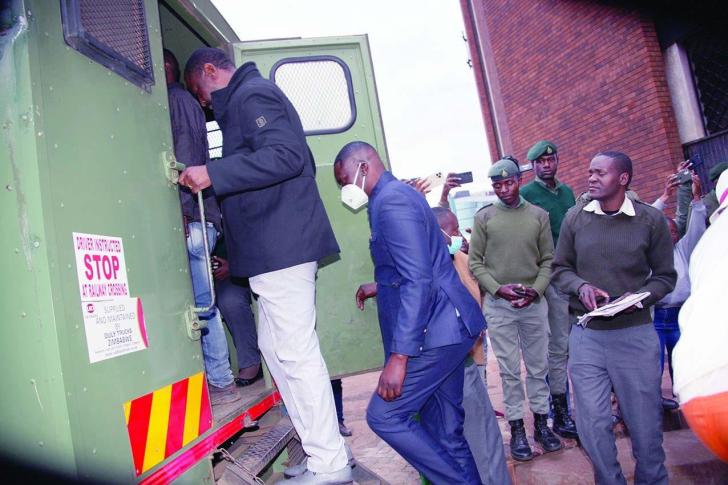News / National
Chimombe, Mpofu fraud case takes a new twist
03 Jun 2025 at 09:06hrs |
0 Views

The high-profile fraud trial involving businessmen Moses Mpofu and Mike Chimombe took an unexpected turn on Monday after the former Permanent Secretary in the Ministry of Agriculture, John Basera, conceded in court that the accused had partially fulfilled their contractual obligations under the now-controversial Presidential Goat Pass-On Scheme.
Mpofu and Chimombe stand accused of defrauding the government of US$7 million as part of an US$87 million agreement awarded to their company, Blackdeck, for the supply of goats under a five-year government initiative aimed at boosting rural livelihoods.
While under cross-examination by Advocate Tapson Dzvetero, Mpofu's legal representative, Basera admitted that Blackdeck met and exceeded its first-year supply target, delivering 3,595 goats against a contractual requirement of 3,113.
Basera also acknowledged that Blackdeck encountered logistical challenges, particularly in mobilising livestock due to Foot and Mouth Disease (FMD) restrictions, which had led the Ministry to adopt a zonal approach for animal movement.
"We had green, red, and buffer zones because of Foot and Mouth Disease. If I remember well, we had made a recommendation to avoid inter-provincial transport of goats and to conduct intra-province distributions instead," Basera explained before High Court judge Justice Pisirayi Kwenda.
Basera further confirmed that Blackdeck successfully delivered 500 goats for the programme's launch event in Chipinge, and on other occasions was requested to supply additional goats for various launch events across the country - even after initial contractual conflicts arose.
In a significant revelation, the court heard that despite the dispute, the Ministry of Agriculture did not activate the conflict resolution clause outlined in the contract, which required either arbitration or recourse to the guarantor. Instead, Basera said preparations to call in the guarantor were underway when he left his position.
"The agreement provided for dispute resolution mechanisms, but those were not pursued at the time," Basera testified.
Prosecutors allege that Mpofu and Chimombe used fraudulent documentation to secure the lucrative goat supply contract. The State contends that the pair received an advance payment of US$7 million, which they have failed to account for - charges both men vehemently deny.
The trial has attracted significant public interest, not only because of the substantial financial figures involved but also due to its implications for transparency and accountability in government-funded livestock programmes.
Proceedings are scheduled to continue on Tuesday, with more witnesses expected to testify and the court likely to scrutinise both the execution of the contract and the government's handling of the dispute.
Mpofu and Chimombe stand accused of defrauding the government of US$7 million as part of an US$87 million agreement awarded to their company, Blackdeck, for the supply of goats under a five-year government initiative aimed at boosting rural livelihoods.
While under cross-examination by Advocate Tapson Dzvetero, Mpofu's legal representative, Basera admitted that Blackdeck met and exceeded its first-year supply target, delivering 3,595 goats against a contractual requirement of 3,113.
Basera also acknowledged that Blackdeck encountered logistical challenges, particularly in mobilising livestock due to Foot and Mouth Disease (FMD) restrictions, which had led the Ministry to adopt a zonal approach for animal movement.
"We had green, red, and buffer zones because of Foot and Mouth Disease. If I remember well, we had made a recommendation to avoid inter-provincial transport of goats and to conduct intra-province distributions instead," Basera explained before High Court judge Justice Pisirayi Kwenda.
Basera further confirmed that Blackdeck successfully delivered 500 goats for the programme's launch event in Chipinge, and on other occasions was requested to supply additional goats for various launch events across the country - even after initial contractual conflicts arose.
In a significant revelation, the court heard that despite the dispute, the Ministry of Agriculture did not activate the conflict resolution clause outlined in the contract, which required either arbitration or recourse to the guarantor. Instead, Basera said preparations to call in the guarantor were underway when he left his position.
"The agreement provided for dispute resolution mechanisms, but those were not pursued at the time," Basera testified.
Prosecutors allege that Mpofu and Chimombe used fraudulent documentation to secure the lucrative goat supply contract. The State contends that the pair received an advance payment of US$7 million, which they have failed to account for - charges both men vehemently deny.
The trial has attracted significant public interest, not only because of the substantial financial figures involved but also due to its implications for transparency and accountability in government-funded livestock programmes.
Proceedings are scheduled to continue on Tuesday, with more witnesses expected to testify and the court likely to scrutinise both the execution of the contract and the government's handling of the dispute.
Source - NewZimbabwe
Join the discussion
Loading comments…



































